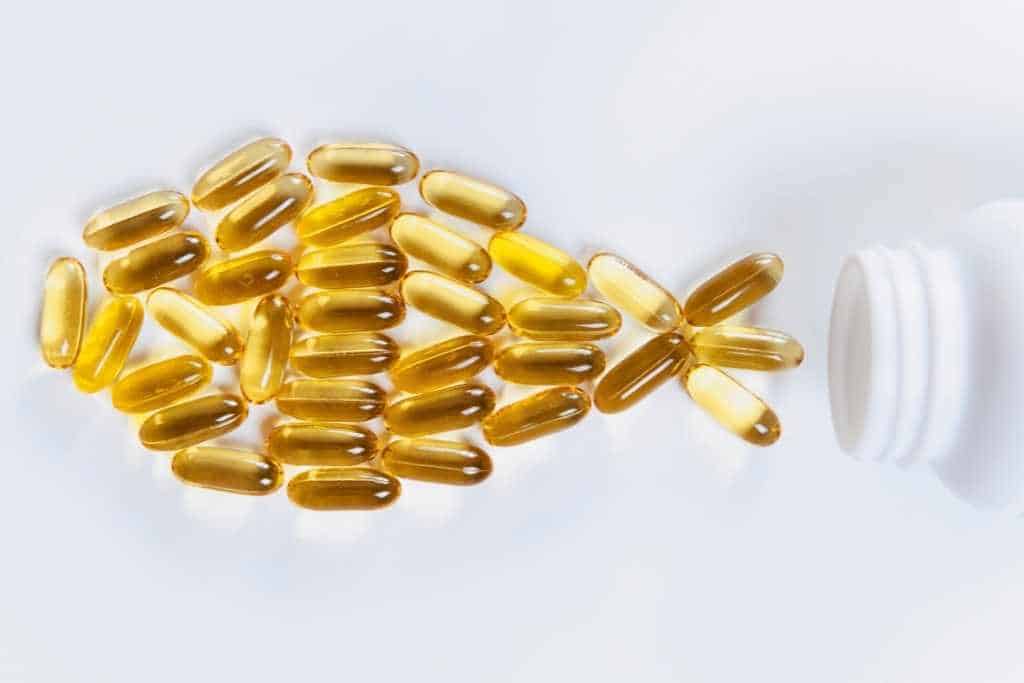Cod Liver Oil vs Omega 3: Which Fish Oil Has More Benefits?
Cod liver oil and omega-3 are two popular fish oil supplements people like to use. For this reason many people wonder which one is better. Let’s answer, which is better cod liver oil or omega 3?
Omega 3 is better than cod liver oil for omega-3 fatty acid intake due to its higher concentration of omega-3. If vitamin A and D are more desired then cod liver oil is better due to its combination of vitamin A and D and omega-3 fatty acids.
This article will take a closer look at the two and compare their nutrients, costs, benefits, mercury levels and side effects.
As a Certified Health Coach many of my clients ask me about fish oil supplements. In addition to coaching clients about them, I’ve researched, purchased and consumed both prior to, during and after writing this article.
Disclaimer: Some links in this article are affiliate links which means I may earn a small commission at no extra cost to you. As an Amazon associate I earn from qualifying purchases. Always check with your physician prior to taking supplements or changing your nutrition habits.

The Difference Between Cod Liver Oil and Omega-3
Many people wonder if there is a difference between the fish oil supplements available on the market. It’s no different when discussing these two. Let’s take a close look at their differences.
Cod liver oil is extracted from the livers of cod fish and omega 3 is extracted from the flesh of fatty fish like sardines, anchovies, sardines, menhaden, herring, mackerel and tuna. Omega 3 contains more fatty acids, calories, total fats and cholesterol than cod liver oil. Cod liver oil contains more vitamin A and D.
Let’s take a closer look at each supplement separately.
What is cod liver oil?
Cod liver oil is extracted from the livers of cod instead of their flesh due to the higher concentration of fatty acids in the liver. It is used as a dietary supplement and provides the omega-3s eicosapentaenoic acids (EPA), docosahexaenoic acids (DHA), vitamin A and D.
A tablespoon contains 4,080 mcg of vitamin A, 34 mcg (1,360 IU) of vitamin D and 0.84 grams of omega-3s1.
The flesh of a cod is lean compared to other fatty fish. The liver of a cod is larger than a typical fish and is where its fatty acids are located. Since it is fish liver oil, it also benefits the absorption of vitamin A and D.
The liver oils are manufactured as a liquid or soft gels. The liquid is taken using a spoon and the soft gels are swallowed orally like any other pill or capsule.
Check Amazon for the current prices here, cod liver oil.

What is omega 3?
Omega 3 is fish oil extracted from the flesh of a fatty fish. Typical fish used for omega-3 are tuna, mackerel, salmon, sardines, anchovies, menhaden and herring. It is used as a dietary supplement and provides the eicosapentaenoic acids (EPA) and docosahexaenoic acids (DHA).
The amount of omega-3s contained in the supplement vary from the manufacturer. The flesh of fatty fish is where most of their omega-3s are located.
The supplements are manufactured as a soft gel or in liquid form. The liquid omega-3 is taken using a spoon and the soft gels are taken orally. A high percentage of the fatty acids come from the DHA and EPA.
Check Amazon for the current prices, omega-3.
Nutrition Comparison of Oil Supplements
The following table compares the nutrients contained in typical fish oils used for omega-3 supplements:
| Nutrient | Cod Liver Oil (1 Tbsp) | Sardine Oil (1 Tbsp) | Menhaden Oil (1 Tbsp) | Salmon Oil (1 Tbsp) | Herring Oil (1 Tbsp) |
| Calories | 41 | 123 | 123 | 123 | 123 |
| Omega-3 | 0.84 g | 3.10 g | 3.62 g | 4.66 g | 1.50 g |
| Total Fat | 4.5 g | 14 g | 14 g | 14 g | 14 g |
| Saturated Fat | 1.0 g | 4.1 g | 4.1 g | 2.7 g | 2.9 g |
| Cholesterol | 25 mg | 97 mg | 71 mg | 66 mg | 104 mg |
Due to its less healthy fat, cod liver oil contains less calories, total fat, saturated fat and cholesterol than the other omega-3 fish oils. For people consuming omega-3 rich fish, cod liver oil may provide the better benefits.
For people who aren’t consuming omega-3s from another source, an omega-3 supplement or fish oil may provide the better benefits. Keep reading the section below to find out how to determine how much omega-3s should be consumed.
They are known for being a part of many diets like keto or heart healthy.
If you’re eating low-carb or want to give keto a try, many of my clients have followed this 28-Day Keto Challenge with great success. Visit their website and check it out.
Costs
Deciding on which oils to consume may involve more than determining whether vitamin D or omega-3 is more important. With the rising costs of almost everything in the supermarkets, the cost is a likely factor. Therefore, let’s take a close look at their prices.
Omega-3 costs more than cod liver oil. The average cod liver oil price is $20.68 per 180 softgels and omega-3 is $26.55 per 180 softgels.
To conduct some original research, I visited the following two stores for the prices of each and found the following results.
Walmart
- Ultra Omega-3 – NOW Brand (500 EPA/250 DHA, 180 Softgels)
- $30.79
- Cod Liver Oil – NOW Brand (1,000 mg, 180 Softgels)
- $18.37
Costco
- Omega-3 – Trunature Brand (900 mg, 200 Softgels)
- $24.99
- Cod Liver Oil – NOW Brand (1,000 mg, 180 Softgels)
- $22.99
Both oils are easy to locate. I typically can find more affordable prices and availability on Amazon, Check them on Amazon and the current prices here, Fish Oils.

Mercury Levels
The FDA and EPA have issued warnings and suggestions regarding mercury levels in fish and how often they should be consumed8. This is especially important for the following:
- Developing children
- Young infants
- Pregnant women
They established a list of the following:
- Fish to avoid
- Good choices
- Best fish
Since mercury is so important, knowing which contains more is crucial. Therefore, let’s examine which one contains more.
Cod liver oil and omega-3 have similar levels of mercury. Cod fish and most of the fish used for omega-3s are listed on the FDA’s best choices regarding mercury levels.
Cod, anchovy, sardines, shrimp, herring, some mackerel and tuna are all on the best choice list.
If you’re pregnant, breast feeding or has a young child, Always check with a physician prior to eating new foods or changing your dietary habits.
Mercury warnings can change over time or affect only a particular area or state. Please check with your local EPA and FDA for the current recommendations9.
I recently completed an article comparing fish oil. Find out which costs more or had more mercury.
Keto Bread Tip: Great News! Did you know, you don’t have to give up your favorite bread, pizza or sandwiches to follow a 100% Keto diet. Find out more in the KetoBreads website by clicking here, Keto Breads.

Omega-3 Fatty Acids in Fish Oils
The omega-3 fatty acids provided by both oils help provide the many benefits listed below. Fatty acids are not made by the body which is why many medical professionals and nutritionists recommend adding omega-3 sources to the diet.
Sources of omega-3 include:
- Fish (seafood)
- Fish oil supplements
- Seeds
The three common omega-3 fatty acids often referred to include:
- Docosahexaenoic acids (DHA)
- Eicosapentaenoic acids (EPA)
- Alpha-linolenic acids (ALA)
DHA and EPA are mainly found in seafood and ALA is found in plant based foods like seeds. ALA converts to DHA and EPA but the conversion rate is very low. Therefore, it’s best to consume DHA and EPA to receive the optimal benefits10.
Find out how krill oil compared in my recent article.
How To Determine The Correct Amount of Fish Oils
There’s no official daily recommendation for how much DHA and EPA omega-3 to take for those aged over one year old. Therefore, to determine how much daily DHA and EPA Omega-3 fatty acids to take:
- Confer with a physician first.
- Compare the dosage on a supplement bottle to the amount provided in a serving of whole fish.
- Read the recommendations on the oil’s supplement bottle.
The Table below contains the omega-3 DHA and EPA recommendations under one year old. In addition, ALA recommendations over one year old. These recommendations are from the National Academy of Medicine.
| Age Group | Male | Female | Pregnancy | Lactation |
| *0-6 months | 0.5 grams | 0.5 grams | ||
| *7-12 months | 0.5 grams | 0.5 grams | ||
| **1-3 years | 0.7 grams | 0.7 grams | ||
| **4-8 years | 0.9 grams | 0.9 grams | ||
| **9-13 years | 1.2 grams | 1.0 grams | ||
| **14-18 years | 1.6 grams | 1.1 grams | 1.4 grams | 1.3 grams |
| **19-50 years | 1.6 grams | 1.1 grams | 1.4 grams | 1.3 grams |
| **51+ years | 1.6 grams | 1.1 grams |
The National Academy of Medicine (IOM), formerly called the Food and Nutrition Board of the Institute of Medicine, established the adequate recommendations for Omega-3 fatty acids ((USDA: What is the Recommended Dietary Allowance (RDA) for omega-3, 6 and 9?)).
They established adequate recommendations for EPA and DHA up to one year old and ALA recommendations from 1 year to adults. The adequate recommendation for infants to one year old is equivalent to the mean intake of omega-3s in healthy, breastfed infants.
They provide this recommendation because human milk provides all three omega-3s, ALA, DHA and EPA.
They only provide recommendations for ALA over one year old because ALA is the only omega-3 essential11.
Additional tips about taking either oil:
- Determine if the omega-3 fatty acids or Vitamins A and D are more important for you.
- If omega-3 is more important the omega-3 provides more.
- If Vitamin A and D are more important, the cod liver oil may be a better choice.
- Don’t take cod liver oil and Omega-3 together.
- Take either one with food to aid digestion and absorption of the oil.
- Never discontinue medication for fish oil or an omega-3 supplement without conferring with a physician first.
The Health Benefits of Oil Supplements and Omega-3
The health benefits for both include the following:
Heart Health Benefits
Heart health benefits may be the most important. They may help keep the heart healthy by preventing the following:
- High cholesterol
- High blood pressure
- Stroke
- Heart attacks
- Heart disease
The fish oil helps to accomplish this by the following:
- Lowering blood pressure.
- Increasing good cholesterol and lowering bad cholesterol.
- Lowering the fat cells in the blood (triglycerides).
- Improving blood vessel function.
A study just released in 2021 examined the effect of cod liver oil on cholesterol. 600 people were split into two groups, one group receiving the oil and the other group a placebo. The oil group lowered total cholesterol almost 20 more than the placebo group.
The LDL cholesterol also lowered approximately 6-7 more than the placebo group. The researchers indicated the oil lowered cholesterol. However, in all cases, lifestyle changes should be the first treatment ((National Center for Biotechnology Information: Role of Cod Liver Oil in Reducing Elevated Lipid Parameters)).
Addition research examined over 34 previous studies which included 1,356 people. It was found the omega-3s in fish oil lowered both systolic and diastolic blood pressure. The researchers found a larger reduction in people with high blood pressure12.
Improved Blood Circulation
Researchers believe the fatty acids help keep a body’s blood vessels strong, capable and flexible. This allows for better blood flow and improved circulation of oxygen ((National Center for Biotechnology: Marine Omega-3 Supplementation and Cardiovascular Disease)).
Reducing Inflammation and Arthritis
Both supplements have anti-inflammatory abilities. For this reason, taking fish oil supplements has been known to help prevent inflammation-related diseases like arthritis, diabetes and even some cancers13.
Eye Health Benefits and Improved Vision
Both can help prevent retina deterioration. If the intraocular pressure (the fluid pressure in the eye or IOP) is greater than the normal range of 12-22 mm/Hg, glaucoma could occur or will at least be a considerable risk.
With a diet rich in omega-3 fatty acids, eye problems can be less likely. They help keep that IOP at a healthy level. These benefits are another fantastic reason to take oil supplements14.
Cognitive Issues
Anything with the Omega-3 and the levels found in oil can help build up and maintain brain cells. Brain cells are constantly being made and repaired by fatty acids. This can decrease the chance of cognitive degenerative diseases like Parkinson’s or Alzheimer’s15.
Side Effects of Cod Liver Oil or Omega-3
Both oils are considered safe. Some minor side effects is why a physician should always be consulted with prior to taking any fish oil supplement. Side effects may include the following:
- Digestion issues
- Bad breath or body odor
- Allergies
- Excessive levels of vitamins A or D
- Easy bleeding
Read Next Additional Fish Oil vs Fish Oil Articles!
Salmon Oil vs Fish Oil: Which Is Better?
- Wikipedia: Cod-liver oil [↩]
- Nutrition Value: Fish oil, sardine [↩]
- Nutrition Value: Fish oil, menhaden [↩]
- Nutrition Value: Fish oil, cod liver [↩]
- Nutrition Value: Fish oil, herring [↩]
- USDA: Omega-3 [↩]
- USDA: Fish Oil [↩]
- FDA: Advice about Eating Fish [↩]
- National Center for Biotechnology Information: Mercury accumulation in largemouth bass (Micropterus salmoides) in a Florida lake [↩]
- National Institutes of Health: Omega-3 Fatty Acids [↩]
- NLM NIH: Omega-3 Fatty Acids [↩]
- Circulation: Does fish oil lower blood pressure? A meta-analysis of controlled trials [↩]
- National Center for Biotechnology Information: Cod liver oil (n-3 fatty acids) as an non-steroidal anti-inflammatory drug sparing agent in rheumatoid arthritis [↩]
- NCBI NLM: Cod liver oil: a potential protective supplement for human glaucoma [↩]
- NIH GOV: Omega-3 Fatty Acids [↩]
